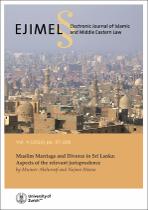| dc.contributor.author | Abduroaf, Muneer | |
| dc.contributor.author | Moosa, Najma | |
| dc.date.accessioned | 2022-09-23T10:04:27Z | |
| dc.date.available | 2022-09-23T10:04:27Z | |
| dc.date.issued | 2016 | |
| dc.identifier.citation | Abduroaf, M. and Moosa, N. (2016) "Muslim Marriage and Divorce in Sri Lanka: Aspects of the relevant jurisprudence." Electronic Journal of Islamic and Middle Eastern Law 4: 97-108 | en_US |
| dc.identifier.issn | ISSN: 1664-5707 | |
| dc.identifier.uri | http://hdl.handle.net/10566/7956 | |
| dc.description.abstract | Muslims form 10 per cent of the Sri Lankan population. The country applies a mixed legal system. For many decades Muslim marriages and divorces have been governed by a separate piece of legislation. Courts in Sri Lanka have interpreted some of the legislative provisions. The purpose of this article is to highlight the case law emanating from Sri Lankan courts interpreting the provisions of the Muslim Marriage and Divorce Act 13 of 1951 dealing with different issues: age for marriage; proof of marriage; co-existence of a civil marriage and a Muslim marriage; maintenance of children especially children born out of wedlock; and types of divorce. | en_US |
| dc.language.iso | en | en_US |
| dc.publisher | The Center for Islamic and Middle Eastern Legal Studies | en_US |
| dc.relation.ispartofseries | Electronic Journal of Islamic and Middle Eastern Law;4 | |
| dc.subject | Muslim Marriage | en_US |
| dc.subject | Muslim Divorce | en_US |
| dc.subject | Sri Lanka | en_US |
| dc.subject | Islamic Law | en_US |
| dc.subject | Jurisprudence | en_US |
| dc.title | Muslim Marriage and Divorce in Sri Lanka: Aspects of the relevant jurisprudence | en_US |
| dc.type | Article | en_US |

